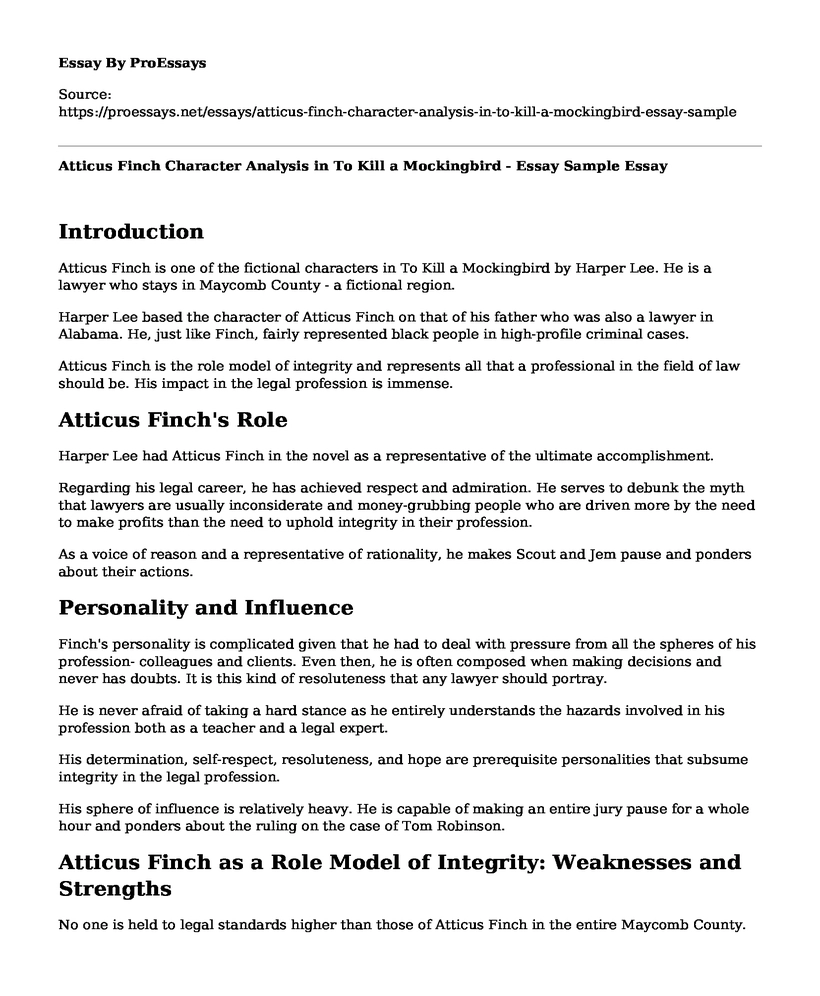Introduction
Atticus Finch is one of the fictional characters in To Kill a Mockingbird by Harper Lee. He is a lawyer who stays in Maycomb County - a fictional region.
Harper Lee based the character of Atticus Finch on that of his father who was also a lawyer in Alabama. He, just like Finch, fairly represented black people in high-profile criminal cases.
Atticus Finch is the role model of integrity and represents all that a professional in the field of law should be. His impact in the legal profession is immense.
Atticus Finch's Role
Harper Lee had Atticus Finch in the novel as a representative of the ultimate accomplishment.
Regarding his legal career, he has achieved respect and admiration. He serves to debunk the myth that lawyers are usually inconsiderate and money-grubbing people who are driven more by the need to make profits than the need to uphold integrity in their profession.
As a voice of reason and a representative of rationality, he makes Scout and Jem pause and ponders about their actions.
Personality and Influence
Finch's personality is complicated given that he had to deal with pressure from all the spheres of his profession- colleagues and clients. Even then, he is often composed when making decisions and never has doubts. It is this kind of resoluteness that any lawyer should portray.
He is never afraid of taking a hard stance as he entirely understands the hazards involved in his profession both as a teacher and a legal expert.
His determination, self-respect, resoluteness, and hope are prerequisite personalities that subsume integrity in the legal profession.
His sphere of influence is relatively heavy. He is capable of making an entire jury pause for a whole hour and ponders about the ruling on the case of Tom Robinson.
Atticus Finch as a Role Model of Integrity: Weaknesses and Strengths
No one is held to legal standards higher than those of Atticus Finch in the entire Maycomb County.
Even while he shows high integrity, Atticus Finch has certain weaknesses that make him an incomplete role model of the same. For instance, he finds it hysterical that Scout would think that women can serve on the jury. The sexism falls in the category of the things against which any expert in the legal profession should fight.
On the same note, Atticus fails to meet the threshold of skills required of a lawyer. Atticus Finch fails to recognize, for instance, that Tom Robinson's testimony could be confirmed, and Mayella Ewells disproved, by checking whether a chiffarobe (a combination wardrobe/chiffonier) is still standing in the Ewells kitchen (Lee, 218).
The weaknesses notwithstanding, Atticus Finch's character as a lawyer stands out. It is noted that when discussing Atticus's virtues, integrity tops the list. He admits that he is no idealist to believe firmly in the integrity of our courts and the jury systemthat is no ideal to me, it is a living, working reality (Lee 51-52). However, a comprehension of the situation requires a preliminary understanding of integrity.
Conclusion
Atticus Finch is the true definition of integrity as it applies to the legal profession. The inherent human weaknesses he portrays cannot overshadow the bigger picture that he serves as a role model for every lawyer.
Cite this page
Atticus Finch Character Analysis in To Kill a Mockingbird - Essay Sample. (2021, Apr 07). Retrieved from https://proessays.net/essays/atticus-finch-character-analysis-in-to-kill-a-mockingbird-essay-sample
If you are the original author of this essay and no longer wish to have it published on the ProEssays website, please click below to request its removal:
- The Devil in the Shape of a Woman: Book Review
- Girl, Interrupted: Susanna Kaysen's Memoir
- Shout by Dagoberto Gilb Essay
- Analysis Essay on Poe's "The Cask of Amontillado"
- Essay Example on Literary Analysis of Frankenstein
- Exploring Walt Whitman's Poetry Styles - Essay Sample
- Frankenstein: How Novels Impact Pop Culture and Science - Essay Sample







